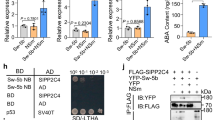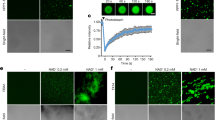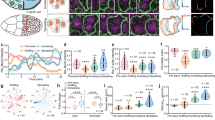Abstract
SEXUAL differentiation in the male and female strains of the water mould Achlya ambisexualis occurs through a series of stages mediated by steroid hormones1. The species-specific and sex-specific hormones, antheridiol and oogoniol2, initiate the development of the male and female sex organs, respectively. Because antheridiol induction depends on RNA and protein synthesis3 and steroid hormones are thought to influence the synthesis of specific proteins in the target cells4, we have investigated the pattern of proteins synthesised in the male strain of A. ambisexualis after administration of antheridiol. We found an ‘induced protein’ with a molecular weight of 69,000. It was detectable 1 h after addition of the hormone. This is analogous to the effect of oestradiol on protein synthesis in the uterus of immature rats5,6.
This is a preview of subscription content, access via your institution
Access options
Subscribe to this journal
Receive 51 print issues and online access
$199.00 per year
only $3.90 per issue
Buy this article
- Purchase on Springer Link
- Instant access to full article PDF
Prices may be subject to local taxes which are calculated during checkout
Similar content being viewed by others
References
Barksdale, A. W., Science, 166, 831–837 (1969).
McMorris, T. C., et al., J. Am. chem. Soc., 97, 2544–2545 (1975).
Kane, B. E., Reiskind, J. B., and Mullins, J. T., Science, 180, 1192–1193 (1973).
Litwack, G. (ed.), Biochemical Actions of Hormones, 3 (Academic, New York,1975).
Notides, A., and Gorski, J., Proc. natn. Acad. Sci. U.S.A., 56, 230–235 (1966).
Katzenellenbogen, B. S., and Gorski, J., J. biol. Chem., 247, 1299–1305 (1972).
Caroll, A. G., Eckberg, W. R., and Ozaki, H., Expl Cell Res., 90, 328–332 (1975).
Mullins, J. T., and Ellis, E. A., Proc. natn. Acad. Sci. U.S.A., 71, 1347–1350 (1974).
Thomas, D. des S., and Mullins, J. T., Physiol. Pl., 22, 347–353 (1969).
Barksdale, A. W., Mycologia, 62, 411–420 (1970).
Barksdale, A. W., and Lasure, L. L., Appl. Microbiol., 28, 544–546 (1974).
McMorris, T. C., and Barksdale, A. W., Nature, 215, 320–321 (1967).
Barksdale, A. W., and Lasure, L. L., Bull. Torrey bot. Club, 100, 199–202 (1973).
Weber, K., and Osborn, M., J. biol. Chem., 244, 4406–4412 (1969).
Author information
Authors and Affiliations
Rights and permissions
About this article
Cite this article
GRONER, B., HYNES, N., SIPPEL, A. et al. Induction of specific proteins in hyphae of Achlya ambisexualis by the steroid hormone antheridiol. Nature 261, 599–601 (1976). https://doi.org/10.1038/261599a0
Received:
Accepted:
Published:
Issue Date:
DOI: https://doi.org/10.1038/261599a0
This article is cited by
Comments
By submitting a comment you agree to abide by our Terms and Community Guidelines. If you find something abusive or that does not comply with our terms or guidelines please flag it as inappropriate.



